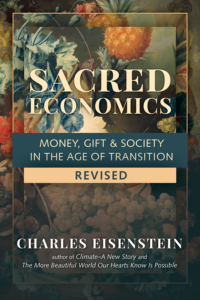Climate — A New Story
Chapters
Chapter 6: A Bargain with the Devil
Hazards of the Global Warming Narrative
I am afraid that, in adopting climate as their keystone narrative, environmentalists have made a bargain with the Devil. At first, climate change seemed a boon to environmentalism, a potent new argument for things we have always wanted, a new reason to shut down the strip mines, to conserve the forests, and ultimately to end the expansion of a consumerist society. Finally we had a do-or-die reason to implement agricultural practices that regenerate the soil; restore forests and wetlands; build smaller homes in higher density communities; implement economies of reuse, upcycling, and gift; foster bicycle culture; and spread home gardening. Accordingly, environmentalists welcomed the climate narrative as a useful ally, a legitimizer of things they wished people would embrace on their own merits.
We the environmentalists thought, “What we’ve wanted to do, now they’ll have to do.” The premises of the conversation shifted away from love of nature and toward fear for our survival. We moved from the heart to the mind, asking that we be motivated by distant consequences—sea levels by the year 2050—rather than by damage that stares us in the face (the fish are gone, the eels are gone, the trees are gone, the whales are gone). Furthermore, we must accept the actuality of these consequences on the word of the scientific establishment. This, at a time when many people (like those in Flint, Michigan, who were told by officials wearing the mantle of science that their water was safe, and like the millions who believe that medical science has failed them) feel betrayed by science and by authority generally.
Let me review some other reasons why I think environmentalists have made a bargain with the Devil:
By resorting to climate change arguments to oppose fracking, mountaintop removal, and tar sands excavation, we put ourselves in a vulnerable position should global warming come into doubt. We might face not monotonic warming but increasingly unstable gyrations that are impossible to attribute convincingly to a single cause. What happens if Earth enters a cooling phase? Does that mean we should put environmental protection on pause? Certainly not, but that is the implication when global warming is the keystone environmental issue. As the resiliency of the skeptics demonstrates, climate change is difficult to prove. While reasonable people can doubt the reality of global warming, there is no doubt that continued degradation of ecosystems will damage and eventually destroy Earth’s ability to maintain climate homeostasis. By invoking climate change as the reason to implement conservation policies, we substitute a hard-to-prove reason for an easy-to-prove reason.
The climate narrative globalizes the issue of “the environment,” demoting local environmental issues to secondary status. If the reason for saving a forest is the CO2, then one could rationalize its destruction by promising to plant another forest somewhere else. In a global framing, faraway people can make the changes. Not me. Not us.
If advocates of fracking or nuclear power can argue plausibly that their technology will reduce greenhouse gas emissions, then by our own logic we must support those too. This has already happened: the “Think about it” campaign touted the climate change benefits of natural gas. Hillary Clinton spoke in praise of “clean coal.” Advocates of genetically engineered crops promise new organisms that will increase carbon sequestration. Giant hydroelectric projects continue to devastate communities and ecosystems around the world. Perhaps worst of all, vast tracts of land in South America, Africa, and Asia are being bought up by corporations with the intention of converting them to biofuels production to produce supposedly carbon-neutral energy. None of these practices can withstand careful scrutiny; nonetheless, they seem plausible enough to bestow upon their subjects a pro-environmental gloss.
By focusing on temperature and CO2, we encourage potentially disastrous geoengineering schemes like dumping iron oxide into the oceans or sulfuric acid into the atmosphere. We imply that a technical tweak to CO2 levels or albedo will solve the problem without a fundamental change in our relationship to the planet, and promote the idea that we can endlessly engineer our way out of the consequences of our actions.
The argument that climate change is bad because it threatens our future strengthens the mentality of instrumental utilitarianism: nature is valuable for its usefulness to us. Don’t the planet and all its beings have a value in their own right? Or is the world, in the end, just a pile of instrumental stuff? If it is in one’s self-interest to limit CO2, it is even more in one country’s, company’s, or individual’s self-interest to limit it less than its competitors. By appealing to self-interest and fear we strengthen the habits of self-interest and fear, which, let’s face it, usually conspire to destroy the planet not save it. We will never increase the amount of care in the world by appealing to self-interest.
Invoking climate apocalypse devalues work that has little foreseeable relevance to climate change. Issues like poverty, homelessness, inequality, incarceration, racism, human trafficking, heavy metal pollution, GMOs, plastic pollution, and so on have a tenuous relationship to atmospheric health. Perhaps we should put all these causes on hold—after all, what will they matter if the planet becomes unlivable?—until we’ve solved the climate change problem.
This mentality is mistaken. The issues listed above have everything to do with climate, because the cause of climate instability is everything: every dimension of our separation from earth, nature, heart, truth, love, community, and compassion. If indeed self and world, humanity and nature, mirror each other and are part of each other, then it should stand to reason that climate instability will accompany instability in the social and political climate, and that imbalances in the natural realm will mirror imbalances in the human. Greenhouse gases are but a medium by which this principle operates.
A Story of Interbeing motivating earth healing neither contradicts nor depends on the story of saving the world from greenhouse gases. It supersedes it. The larger story of humanity in service to the healing and flourishing of Gaia is already bursting to take over. It is already the real motivating force behind a lot of work that people legitimize with climate narratives. Ecological restoration gets a boost in funding and attention if you make it about climate change, but as described above this is a dangerous strategy. Let’s embrace the true motivation. Let’s admit that we are acting from love of this forest, not for its instrumental role in global carbon sequestration. That we are acting from love of this soil, this lake, this estuary, this place, trusting that the health of one will contribute to the health of all, whether or not we can cite a climate argument to prove it.
A friend wrote to me about her involvement in the California Healthy Soils Initiative, “The initiative is about soil but it has to pretend to be about climate change to get funding, much like every environmental problem.” It might get more funding that way, but such arguments often seem contrived. No wonder right-wing bloggers accuse climate change activists of having an ulterior “agenda.” I think most of them do have an agenda—only it isn’t to install a socialist One World Government or further the diabolical plots of George Soros.[1] It is to protect what is sacred to us. And so we use climate arguments for causes that aren’t at heart about climate change.
Climate activists, listen. Understanding the role of ecosystems in maintaining climate equilibrium means that you can bypass skeptics’ arguments and build alliances by framing issues outside the carbon narrative. That’s because you understand that any ecological healing will stabilize the climate too.
The same is true of social, cultural, relational, and personal healing. Everything is connected to everything else. While quantitative arguments can never demonstrate it, in our poetic hearts we know that the atmospheric climate somehow mirrors the political climate, social climate, and spiritual climate, and vice versa.
End Notes
[1] If you have no idea what I’m talking about, read the comments sections of right-wing articles about climate change.






